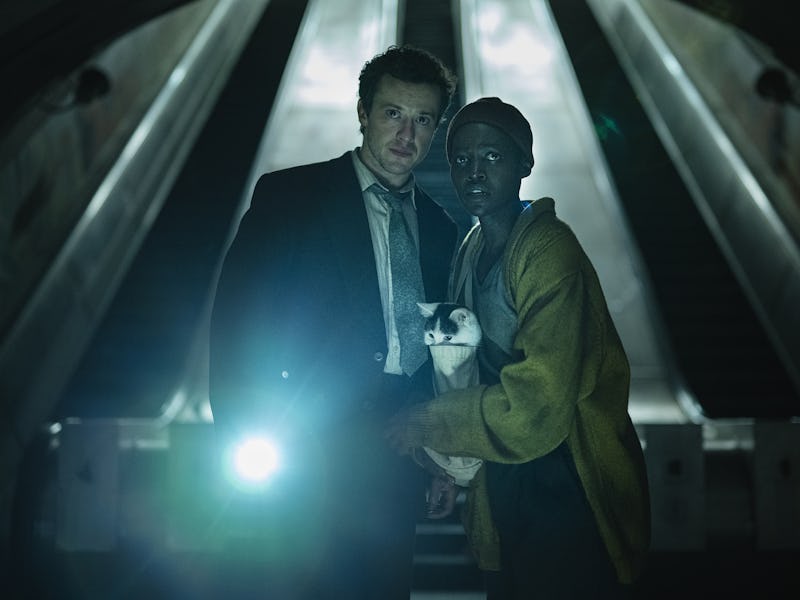A Quiet Place: Day One Perfectly Embodied One 2024 Horror Movie Trend
The most unexpected sci-fi blockbuster of last year is finally streaming.

Silence can begin to feel oppressive in a horror movie. Think of a hand inching towards a closed door, or a secluded alleyway that goes suspiciously quiet. In the silence, there is anticipation, and a longing for a burst of sound to puncture the tension.
Some of 2024’s most inventive horror films understand this, thriving on quiet, withholding instead of introducing sound. Noise, in these movies, instead begins to feel invasive and intrusive, an unwanted presence that we reflexively bristle at. In Chime, a cooking instructor is slowly driven insane by the sound of a chime that only he can hear, but the audience is never privy to this noise. Instead, writer-director Kiyoshi Kurosawa fills the film with the natural sounds of the cityscape, laying the groundwork for the madness lurking under the mundanity of everyday life. In A Violent Nature, a slasher described as an “ambient horror” film, contains no score. Instead, the forest in which it’s set lends itself to a terrifying sonic contrast between the rhythmic calm of the murderer’s footsteps and the panicked unsteadiness of his victims as they stagger away. And in Azrael, set in a post-Rapture world, speech is considered to be a sin among cultists. Their scarred throats, from which only guttural noises emanate, reveal just what they’ve had to sacrifice.
Silence has always been a crucial component of the A Quiet Place franchise — it’s the only way to avoid being detected by invading predatory aliens highly attuned to sound — but Day One enriches this thematic conceit through its main characters’ backgrounds. Both belong to groups that have been historically marginalized and silenced. Terminally-ill cancer patient Samira (Lupita Nyong’o) is Black, while law student Eric (Joseph Quinn) — though it isn’t evident in the movie — is gay, according to director Michael Sarnoski.
Samira lives like she’s already a ghost of herself, so fixated on the ticking clock of her impending demise that she forgets to savor the time she has left. She puts up walls, is aloof and responds in insults and cutting sarcasm. It’s only when she meets and gets to know Eric, so lost and vulnerable in the wake of the invasion, that she finally embraces vulnerability herself. If one is dying, the other desperately wants to live. Their conversations are deeply moving, but more importantly, they develop a companionable silence. The film’s best scene is wordless — when Samira realises Eric has missed the last boat out of the city to stay back with her, she gives him her coat to shield him from the cold. It’s a moment of human connection amid the destruction, two people reaching out as the world falls apart around them.
Samira (Lupita Nyong’o) stifles her scream right after the alien attack.
Day One isn’t without its genre thrills. Every routine sound feels amplified, from the footsteps of people in mass exodus to a wheelchair being rolled across the pavement; each might as well be a homing beacon for the bloodthirsty creatures. The film derives tension from characters having to stifle their natural urge to scream when a predator is mere inches from their face — a single moment of clumsiness could be their last. It also ups the ante by adding a pet to the mix, Samira’s cat Frodo, who is just one ill-timed meow or precarious position away from sealing his owner’s fate.
Despite retreading the familiar ground of its franchise territory, however, it’s the emotional landscape of Day One that remains compelling and sets it apart from the rest of 2024’s “quiet horror” films. Grieving the loss of a loved one out loud becomes a luxury, as is having a breakdown. To call out for a missing relative is to invite your own demise. In constant pain, Samira can only let out a cathartic primal scream in time with the thunder.
Unlike other apocalyptic films, which hinge on their protagonists’ fight to survive until the end, Samira’s imminent demise has been set in stone from the beginning. It was never a question of whether she could make it out alive, but if she could face her mortality on her own terms. Her quest for a slice of pizza, a journey that propels the film, assumes the larger significance of her wanting back a piece of her childhood at the end of her life. And it’s only when she’s revisited her past and secured Eric and Frodo’s futures that she’s able to let go, choosing how and when she dies. In New York, a city that gives off an average of 90 decibels — the “volume of a constant scream” as a title card declares — she manages to make her one last shout into the void heard.